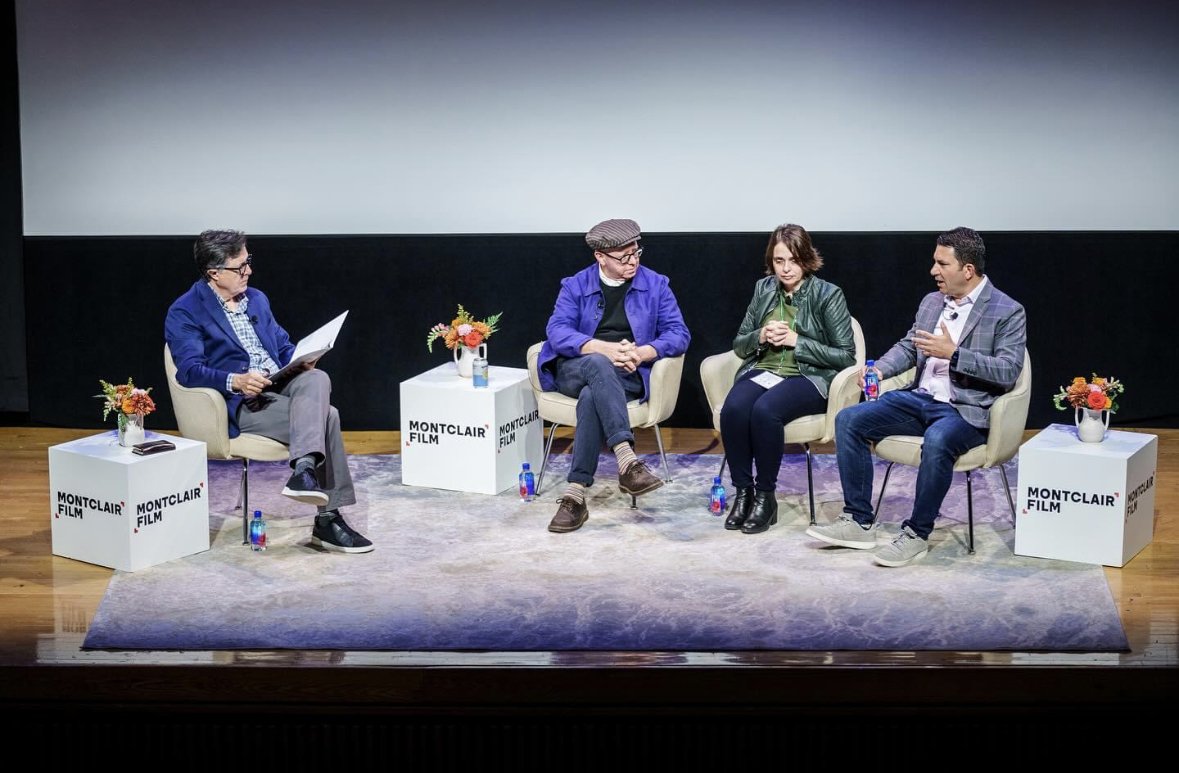The Late Show With GenAI: A Panel Discussion With Stephen Colbert
By Greg Kahn
Emerging Tech Exchange
Founder & CEO
Published on October 24, 2023
Can we harness the power of artificial intelligence to improve our quality of life and expand access to knowledge or will AI create a future driven by disinformation and economic displacement that generates a collective upheaval of the status quo?
Late Show host Stephen Colbert was all about the “big questions,” such as that one about the rise of generative AI at Sunday’s Montclair Film Festival on Sunday.
I was honored to share the stage with Stephen and two other panelists: James Schamus, co-founder of Focus Features, and Dr. Anna Feldman, chair, Department Of Linguistics & Professor, Computer Science, Montclair State University.
Colbert posed a critical question about the uses of new technology that will attract significant capital. Noting a dinner he’d had with an early investor in OpenAI, the parent of ChatGPT, who told Colbert that “AI will be way bigger than the telephone, way bigger than any technology you can imagine.”
He asked if I agreed.
“There are projections that this will be a multi trillion dollar industry within the next 10 years,” I responded. “The way to think about what’s coming is that the next wave of technology is being built on 5G, spatial computing, the mobile revolution. Now we have these Large Language Models that are reinventing every industry.”
Colbert dived deeper into the potential hype and the current fascination with AI, referring to it as a "shiny object" in the tech landscape (“But it’s not a shiny object in the way a magician uses something to distract and deflect attention from something real,” he added).
He also jokingly noted the challenge of defining human intelligence.
The conversation then turned to AI applications, including AI religion chatbots like Halo, which could offer religious interpretations or viewpoints based on personal data. AI could also analyze societal conditions, such as those emerging from the pandemic.
When discussing the role of AI in creativity, I suggested that AI is forming new ways that fashion, art, commerce can coexist with the traditional notions of human-centered intelligence.
There's the web3 movement, where artists are exploring innovative content distribution methods and community development. AI also enables creative mashups, such as merging historical images of quick-service restaurants with high-end fashion, representing a new approach to fashion.
“One example of a creative mashup I’ve been impressed with — call it art or call it fashion — is the combination of historical images of quick service restaurants and apparel,” I said. “The idea is that 7-11 could sell branded shoes that appear crafted by a high-end designer. It’s a whole new way of thinking about fashion.”
Generative AI's commercial use has only emerged recently — less than a year — and it's advancing faster than regulatory policies can catch up. Professional sectors like law and healthcare are beginning to form guidelines, and I anticipate leaders at gatherings like January’s World Economic Forum will outline some guidelines for business and policymakers..
When Colbert brought up security issues related to AI, I couldn’t help but note how many data breaches we’ve been through over the last several years. Just this past week, genetic testing company 23andMe — a non-AI player — had such a leak. If your DNA was submitted there, you’ve been exposed. So that issue is much wider than issues posed solely by AI’s advance.
For the most part, the discussion highlighted AI's potential to bridge the digital divide in education and healthcare.
“We saw the crux of the digital divide in education during Covid,” I noted. “We had lockdowns where some kids didn’t have access to connectivity and other technology and were set back. The notion that everyone can have their own personalized tutor no matter their particular challenge is achievable through AI.”
It’s been an enormous problem for parents across the country to try to figure out, depending on the situation their kids are in. For example, most kids don’t have access to tutors or other learning materials.
There’s a corollary to telemedicine and health care as well.
“If you can have access to more personalized instruction that is data-based, you can ingest that data and have a better mechanism in place to teach science and the humanities,” I told the panel. “And it doesn’t have to be text-based. It could also be video-based, animated. Everyone learns in a different way. And AI tools can be used to adapt to those different pathways students benefit from.”
It’s not just AI; in terms of education applications, I’m most bullish about Apple’s 2024 release of its Vision Pro headset.
“Apple and its spatial computing system could allow students to be immersed in a lesson in a way we’ve never seen before,” I said. “It’s personalized, but it’ll also be harmonized with anything else that’s going on in other places. But it’s very focused on what your personal learning profile and style are.”
Greg Kahn
Emerging Tech Exchange
Founder & CEO






